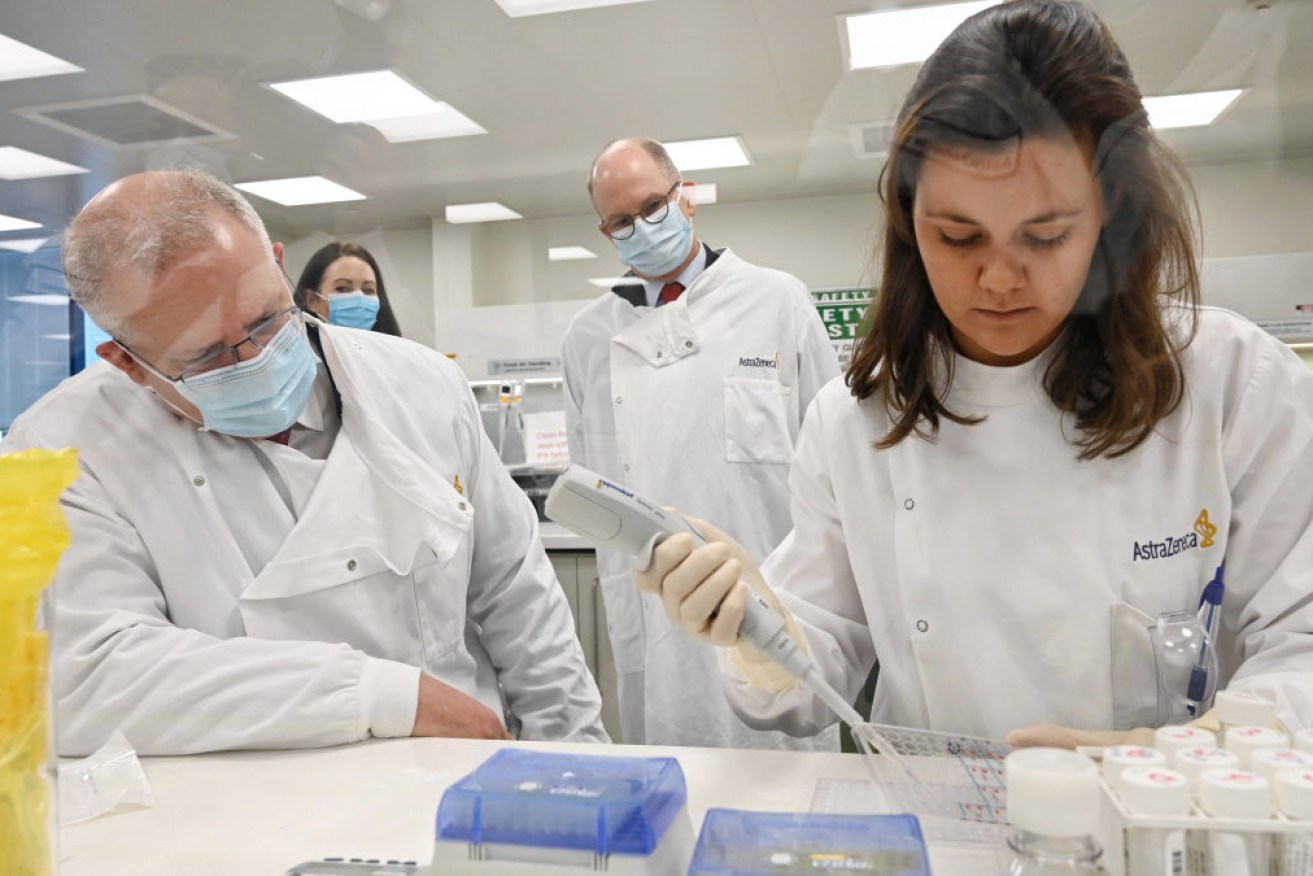‘Adverse reaction’ brings Oxford coronavirus vaccine trial to a halt


Scott Morrison is briefed on the AstraZeneca vaccine during an August visit to the pharma outfit's Sydney lab. Photo: AAP
Trials of an Oxford University coronavirus vaccine have been put on hold after a participant experienced a serious adverse reaction.
Australia has ordered doses of the AstraZeneca vaccine, which was expected to be rolled out in 2021, if trials proved successful.
National deputy chief medical officer Nick Coatsworth said the delay did not necessarily mean the vaccine deal was dead, but the adverse reaction needed to be investigated.
Dr Coatsworth said he was not worried about the trial being put on hold and praised the transparency of those testing the vaccine.
“I’m going to wait to see exactly what the adverse reaction was and whether they attribute it to the vaccine,” he told Nine on Wednesday.
The company said in a statement on Tuesday its “standard review process triggered a pause to vaccination to allow review of safety data”.
AstraZeneca didn’t reveal any information about the possible side effect except to call it “a potentially unexplained illness”.
News site STAT first reported the pause in testing, saying the possible side effect occurred in Britain.

AstraZeneca said the trial halt was triggered by a “standard review”. Photo: AAP
An AstraZeneca spokesperson confirmed the pause in vaccinations covered studies in the US and other countries.
Late in August, AstraZeneca began recruiting 30,000 people in the US for its largest study of the vaccine.
It also is testing the vaccine, developed by Oxford University, in thousands of people in Britain, and in smaller studies in Brazil and South Africa.
Two other vaccines are in huge, final-stage tests in the US, one made by Moderna Inc and the other by Pfizer and Germany’s BioNTech.
Those two vaccines work differently to AstraZeneca’s, and the studies already have recruited about two-thirds of the needed volunteers.
Temporary holds on large medical studies aren’t unusual, and investigating any serious or unexpected reaction is a mandatory part of safety testing.
AstraZeneca pointed out that it was possible the problem could be a coincidence, adding illnesses of all sorts can arise in studies of thousands of people.
“We are working to expedite the review of the single event to minimise any potential impact on the trial timeline,” the company said.
On Monday, Prime Minister Scott Morrison and Health Minister Greg Hunt said the federal government had struck a deal with manufacturer CSL to produce nearly 85 million doses of two promising COVID vaccine candidates – one was AstraZeneca’s, the other from the University of Queensland.
CSL had previously said it was focusing on the UQ vaccine, but Monday’s $1.7 billion announcement included funding to upgrade its Melbourne laboratory facilities so it could also produce the Oxford candidate.
The development came the same day that AstraZeneca and eight other drugmakers issued an unusual pledge, vowing to uphold the highest ethical and scientific standards in developing their vaccines.
The announcement follows worries US President Donald Trump will pressure the US Food and Drug Administration to approve a vaccine before it’s proven to be safe and effective.
The US has invested billions of dollars in efforts to quickly develop multiple vaccines against COVID-19.
But public fears that a vaccine is unsafe or ineffective could be disastrous, derailing the effort to vaccinate millions of Americans.
-with AAP








